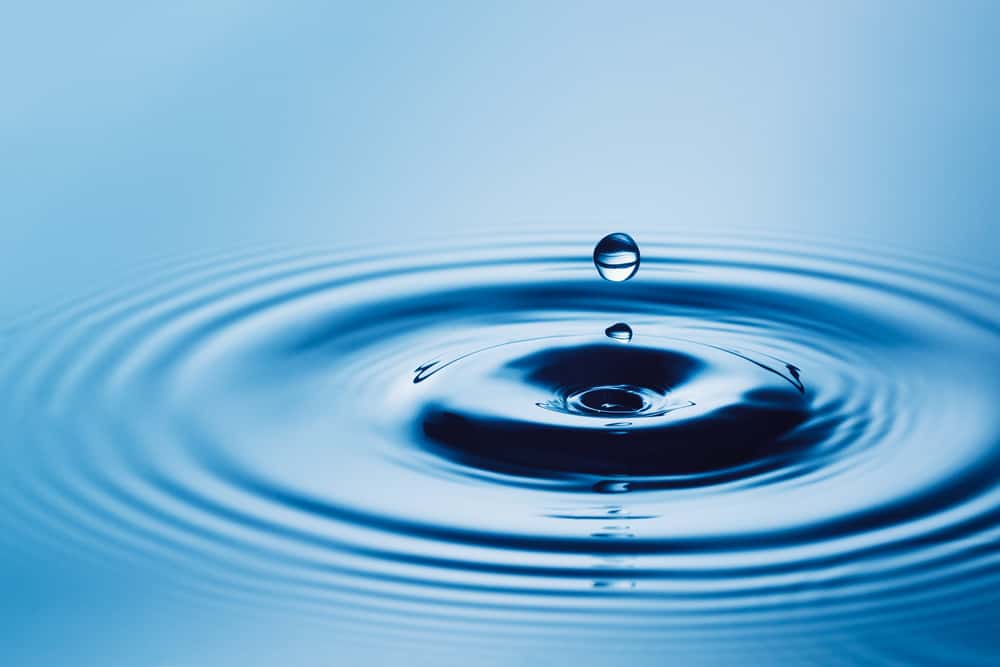
The element of water is the fourth of the five elements of Ayurveda. In Sanskrit, it is called Apas of Jala.
Water evolves from the elements of ether, air, and fire. Every element, as it evolves, it becomes denser in quality. The fire element has a denser quality than air, and water is even thicker than fire.
Water is fluid, flowy, and has no shape, and its cohesiveness binds all things together.
The qualities of the Element of Water
- It is liquid and moisty
- Oily
- Calming and soothing
- Cooling
- Smooth and soft
- Flowy
- Heavy
- Stable and strong
The Element of Water and the Physical Body

The fourth element of Ayurveda – water is one of the most important elements of Ayurveda. We, humans, are to a large extent made of the element of water.
Water is the element that primarily protects our body and provides it with its most fundamental nourishment.
Water is very healing; it protects, nourishes, and binds the body together.
The water element is found in all the body fluids such as blood, urine, stools, sweat, saliva, and mucus and governs it all.
Water is associated with pain, discomfort, or inflammation arising from the joints (muscles, tendons, ligaments, and bones) and smooths all the body’s aches and inflammations.
Water expresses itself in the human body in five different ways. These are known as the five types of Kapha.
- Bodhaka Kapha – is the salivary fluid that protects the mouth against enzymes.
- Kledaka Kapha – is the fluid that supports the digestive system and protects the stomach against acids.
- Tarpaka Kapha – is the fluid that protects the brain’s nerves.
- Sleshaka Kapha – is the fluid that moistens and protects the joints from frictions.
- Avalambaka Kapha – is the fluid that keeps the lungs healthy and protects the respiratory system from dehydrating.
The fourth element of Ayurveda – water is related to the sense of taste. It is the first element that we can taste.
The sense organ of water is the tongue; it is through the tongue that we get to taste it all, and when there is no water or saliva on the tongue, the taste buds don’t function, and therefore there is no taste.
Water in excess may result in obesity and issues with the digestive system.
Water deficiency may result in:
- Weight loss
- Dehydration
- Dry skin, eyes, and lips
- Hard and dry stools
- Lots of sweating
- Less peeing
- Weakness in the reproductive system
Eating sweet foods, such as cooked grains, nuts, oils, and fatty foods, is an excellent way to rebalance the water element.
It is crucial to drink water when feeling hot, ungrounded, dehydrated, have low self-esteem, feel blocked or paralyzed, irritable and vulnerable, or too cold-hearted.
Ayurveda suggests drinking a glass of lukewarm water first thing in the morning immediately after waking up. And not to drink lots of water before or during meals.
The Element of Water and Taste

Everything in the Universe contains all the five elements, each in its unique quantity.
As to our diet, the taste of sweet consists of the most water. And the appropriate amount of sweet can balance the water element in the body.
Examples of sweet taste:
- Whole grains
- Sweet fruits
- Milk
- Oils
- Nuts
The Season of the Element of Water is Spring
The season of water is Spring—the season when the snow melts down and flows from the mountains into rivers. And as the water begins to flow, nature blossoms.
During Spring, the water in our body also increases and flows more. It is crucial to minimize the intake of sweets and oils around this time to maintain a proper balance.
The Element of Water and the Dosha
The Kapha dosha consists of the elements of water and earth. Water complements the heavy qualities of the earth element in the body.
If your Kapha dosha is in balance, the water element in your body is most likely also in balance. If you are retaining too much or not enough water, you might want to consider your dosha’s condition.
To learn more about Ayurveda and your dosha please refer to An Introduction to Ayurveda and Ayurveda Lifestyle and Daily Routines for a healthy Ayurvedic routine.
ADDITIONAL RESOURCES
- Introduction to the Five Elements of Ayurveda
- The First of the Five Elements of Ayurveda – ETHER
- The Second of the Five Elements of Ayurveda – AIR
- The Third of the Five Elements of Ayurveda – FIRE
- The Fifth of the Five Elements of Ayurveda – EARTH
And, if you enjoyed this post, make sure to leave me a comment below. I’d love to hear from you.